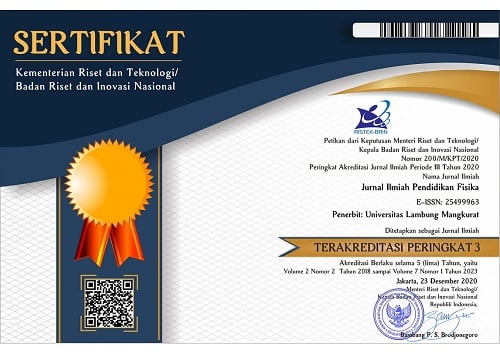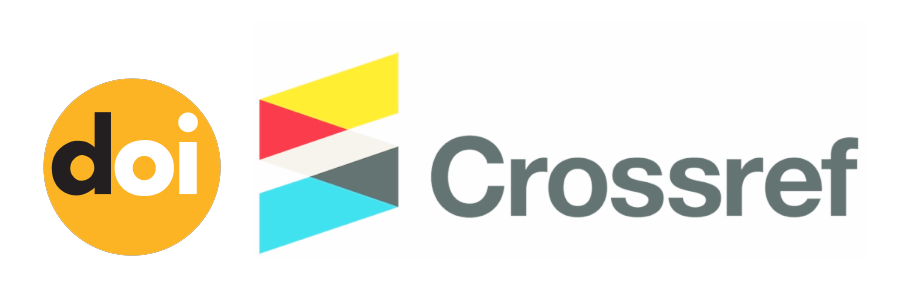Meta-Analysis: The Effect of PhET Simulation Media on Enhancing Conceptual Understanding in Physics Learning
Abstract
In the learning process, using interesting media can improve the quality of learning, especially in understanding concepts. PhET simulation media is one of the learning media that can be used. This research is one type of research to know how high the effect of learning by using PhET simulation media using meta-analysis to improve understanding of concepts in physics learning is. Meta-analysis, used as a research method, consists of formulating problems, collecting, coding, analyzing, and interpreting data. The population and sample were used as research material in scientific articles published nationally discussing the effect of PhET simulation media to improve understanding of concepts in physics learning in 2017–2022. Based on the research conducted, an effect size value of 1.48 was obtained, and the interpretation of the effect size value of the effect of PhET simulation media with the dependent variable, namely understanding of concepts in physics learning, was 92% so that the research conducted was classified in the high category. This means that the PhET simulation media have a strong effect on increasing the effectiveness of students' understanding of concepts in physics learning, especially at the SMA, SMK, or MA education level. Thus, PhET is one of the learning media in the form of interactive simulations that can be utilized in education because it presents complex data about processes and concepts so that students can more easily understand the subjects taught in detail.
Keywords
Full Text:
PDFReferences
Abdi, M., Mustafa, M., & Pada, A. (2021). Penerapan pendekatan stem berbasis simulasi PhET untuk meningkatkan pemahaman konsep fisika peserta didik. Jurnal IPA & Pembelajaran IPA, Query date: 2022-12-14 22:40:41. http://202.4.186.66/JIPI/article/view/21774
Anitah, W. (2014). Strategi pembelajaran ekonomi dan koperasi. Jakarta. Universitas Terbuka.
Coe, R. (2021). Effect size 39. Research Methods and Methodologies in Education.
Cohen, J. (2013). Statistical power analysis for the behavioral sciences. taylorfrancis.com. https://doi.org/10.4324/9780203771587
Cooper, H., Hedges, L., & Valentine, J. (2019). The handbook of research synthesis and meta-analysis. Russell Sage Foundation
Elazony, M., Khalifa, A., & Alsaied, M. (2010). Improve port operations using e-learning and simulation-based training. IJICIS, 10(2).
Fan, X., Geelan, D., & Gillies, R. (2018). Evaluating a novel instructional sequence for conceptual change in physics using interactive simulations. Education Sciences, 8(1), 29.
Fathurohman, C. (2018). Penerapan media simulasi PhET Untuk meningkatkan pemahaman konsep siswa sma pada materi fluida (Pada Siswa MA Al-Inayah Tahun Pelajaran 2018/2019) (Doctoral Dissertation, Universitas Sultan Ageng Tirtayasa).
Finkelstein, N., Dubson, M., Podolefsky, N., Perkins, K. K., Adams, W. K., & Weiman, C. E. (2015). New instrument for measuring student beliefs about physics and learning physics: The Colorado Learning Attitudes about Science Survey.
Ginting, F. W., Novita, N., & Rahmadhani, Y. (2020). Penerapan model TGT melalui simulasi PhET terhadap peningkatan pemahaman siswa pada alat-alat optik. Relativitas: Jurnal Riset Inovasi Pembelajaran Fisika, 3(2), 1-9.
Harjono, H. (2022). Development of “ve-board”: A simple media for physics learning for class x sma. Jurnal Guru Dikmen dan Diksus, 5(1), 59-73.
Hasni, W., & Situmorang, R. (2018). Pengaruh model pembelajaran kooperatif tipe group investigation (GI) terhadap hasil belajar siswa pada materi pokok fluida dinamis di kelas xi. INPAFI (Inovasi Pembelajaran Fisika), 5(4).
Heo, M. (2009). Digital storytelling: An empirical study of the impact of digital storytelling on pre-service teachers’ self-efficacy and dispositions towards educational technology. Journal of Educational Multimedia and Hypermedia, 18(4), 405-428.
Hikmah, N., Saridewi, N., & Agung, S. (2017). Penerapan laboratorium virtual untuk meningkatkan pemahaman konsep siswa. EduChemia (Jurnal Kimia dan Pendidikan), 2(2), 186-195.
Ismaun, I. (2019). Pengaruh media PhET simulations terhadap pemahaman konsep model molekulsiswa sma negeri 1 mawasangka. Al-TA’DIB: Jurnal Kajian Ilmu Kependidikan, 12(1), 99-115.
Jania, J., Suswati, L., & Rosmiati, R. (2022). Pengaruh media virtual laboratorium simulasi phet pada materi fisika hukum hooke terhadap pemahaman konsep siswa kelas xi. Gravity Edu: Jurnal Pembelajaran dan Pengajaran Fisika, 5(1), 14-18.
Juniartini, N. W., Sudiatmika, A. I. A. R., & Sujanem, R. (2017). Pengaruh model pembelajaran perubahan konseptual berbantuan simulasi phet untuk meningkatkan pemahaman konsep fisika siswa. Jurnal Pendidikan Fisika Undiksha, 7(2), 109-119.
Kalsum, U., Hamzah, H., & Nurdia, N. (2019). Penerapan model pembelajaran discovery learning menggunakan media lab virtual phet terhadap pemahaman konsep fisika. PHYDAGOGIC: Jurnal Fisika dan Pembelajarannya, 2(1), 29-37.
Kirkwood, A., & Price, L. (2014). Technology-enhanced learning and teaching in higher education: what is ‘enhanced’and how do we know? A critical literature review. Learning, media and technology, 39(1), 6-36.
https://doi.org/10.1080/17439884.2013.770404
Kurniawan, R. A., Rifa’i, M. R., & Fajar, D. M. (2020). Analisis kemenarikan media pembelajaran phet berbasis virtual lab pada materi listrik statis selama perkuliahan daring ditinjau dari perspektif mahasiswa. VEKTOR: Jurnal Pendidikan IPA, 1(1), 19-28.
Kustyarini, K., Utami, S., & Koesmijati, E. (2020). The importance of interactive learning media in a new civilization era. European Journal of Open Education and E-Learning Studies, 5(2).
Kusyanti, R. (2021). Development of interactive digital module based on virtual laboratories in the covid-19 pandemic era in dynamic fluid materials. International Journal of Active Learning, 6(1), 41-48.
Maghfiroh, S., Wilujeng, I., Jumadi, J., & Masyitha, D. (2023). Development of Physics E-Module Based on Discovery Learning to Improve Students’ Scientific Literacy. Jurnal Penelitian Pendidikan IPA, 9(2), 447-453.
Mahtari, S., Wati, M., Hartini, S., Misbah, M., & Dewantara, D. (2020). The effectiveness of the student worksheet with PhET simulation used scaffolding question prompt. Journal of Physics: Conference Series, 1422(1), 012010. IOP Publishing.
Maulani, R. N., Wati, M., Misbah, M., Dewantara, D., & Mahtari, S. (2018). The development of the PhET learning program's learning support worksheet. Prosiding Seminar Nasional Fisika (SNF), 2, 105-110.
Maulida, I. N., Taufik, M., & Kosim, K. (2022). Pengaruh media PhET dalam model discovery learning terhadap pemahaman konsep fisika peserta didik. Jurnal Ilmiah Profesi Pendidikan, 7(3), 1150-1156.
Moore, E. B., Chamberlain, J. M., Parson, R., & Perkins, K. K. (2014). PhET interactive simulations: Transformative tools for teaching chemistry. Journal of chemical education, 91(8), 1191-1197.
Muzana, S. R., & Astuti, D. (2017, November). Penerapan Pembelajaran Berbasis Simulasi PhET untuk Meningkatkan Pemahaman Konsep Fisika Inti pada Siswa SMA. Prosiding SEMDI-UNAYA (Seminar Nasional Multi Disiplin Ilmu UNAYA, 1(1), 409-417.
Nasir, M., Cari, C., Sunarno, W., & Rahmawati, F. (2021). Article diagnostic difficulties and misconceptions of light refraction: A need analysis learning abstract concepts using PhET simulation. International Joint Conference on Science and Engineering 2021 (IJCSE 2021), 317-322. Atlantis Press.
Nefrita, N. (2019). Implementation of phet learning media in efforts to improve activities and physics learning outcomes of students in class xi sma 4 pekanbaru. Jurnal Geliga Sains: Jurnal Pendidikan Fisika, 7(1), 46-54.
Nguyen, H. T., Herndon, C. A., Cooper, C., Gatti, J., Kirsch, A., Kokorowski, P., ... & Campbell, J. B. (2010). The Society for Fetal Urology consensus statement on the evaluation and management of antenatal hydronephrosis. Journal of pediatric urology, 6(3), 212-231.
Ni'mah, M., & Widodo, W. (2022). Penerapan model pembelajaran inkuiri terstruktur berbantuan virtual-laboratory phet untuk meningkatkan pemahaman konsep listrik dinamis. Pensa: E-Jurnal Pendidikan Sains, 10(2), 296-304.
Nisa, F. C., Lesmono, A. D., & Bachtiar, R. W. (2018). Model pembelajaran kontekstual relating, experiencing, applying, cooperating, and transferring (REACT) dengan simulasi virtual dalam pembelajaran fisika di SMA (Materi momentum, impuls dan tumbukan kelas X SMAN 2 Jember). Jurnal Pembelajaran Fisika, 7(1), 8-14.
Nisa, H., Junus, M., & Komariyah, L. (2022). Penerapan model problem based learning berbantuan simulasi PhET berbasis instrumen HOTS terhadap hasil belajar siswa. Jurnal Ilmiah Pendidikan Fisika, 6(3), 560-567.
Nurdini, S. D., Husniyah, R., Chusni, M. M., & Mulyana, D. E. (2022). Penggunaan physics education technology (phet) dengan model inkuiri terbimbing untuk meningkatkan hasil belajar siswa pada materi fluida dinamis. Jurnal Ilmiah Pendidikan Fisika, 6(1), 136-146.
Oktamuliani, S., Centaury, B., Muhaimin, S., Afdal, A., Adrial, R., Muldarisnur, M., ... & Mahyudin, A. (2021). Simulasi PhET sebagai laboratorium virtual dalam peningkatan pemahaman konsep fisika siswa SMAN 3 Painan, Pesisir Selatan. Warta Pengabdian Andalas, 28(4), 509-513.
Prawiradilaga, D. (2016). Mozaik teknologi pendidikan: E-learning.
Pujiyono, P., Sudjito, D. N., & Sudarmi, M. (2016). Desain pembelajaran dengan menggunakan media simulasi phet (physics education and technology) pada materi medan listrik. UPEJ Unnes Physics Education Journal, 5(1).
Puspitarini, Y. D., & Hanif, M. (2019). Using learning media to increase learning motivation in elementary school. Anatolian Journal of Education, 4(2), 53-60.
Rizaldi, D. R., Jufri, A. W., & Jamaluddin, J. (2020). PhET: Simulasi interaktif dalam proses pembelajaran fisika. Jurnal Ilmiah Profesi Pendidikan, 5(1), 10-14.
Rohman, M. M. (2019). Pengembangan e-learning sebagai media pembelajaran simulasi dan komunikasi digital bagi siswa SMK. Jupiter (Jurnal Pendidikan Teknik Elektro), 4(1), 25-33.
Saregar, A. (2016). Pembelajaran pengantar fisika kuantum dengan memanfaatkan media phet simulation dan LKM melalui pendekatan saintifik: Dampak pada Minat dan Penguasaan Konsep Mahasiswa.
Jurnal ilmiah pendidikan fisika Al-Biruni, 5(1), 53-60.
Sarı, U., Hassan, A. H., Güven, K., & Şen, Ö. F. (2017). Effects of the 5E teaching model using interactive simulation on achievement and attitude in physics education. International Journal of Innovation in Science and Mathematics Education, 25(3).
Sasmita, P. R. (2017). Penerapan metode inkuiri terbimbing menggunakan media kit fisika: upaya meningkatkan aktivitas dan hasil belajar fisika siswa. Jurnal Ilmiah Pendidikan Fisika Al-Biruni, 6(1), 95-102.
Setiadi, R., & Muflika, A. A. (2012). Eksplorasi pemberdayaan courseware simulasi PhET untuk membangun keterampilan proses sains siswa SMA. Jurnal Pengajaran MIPA, 17(2), 258-268.
Setiadi, R., & Muflika, A. A. (2012). Eksplorasi pemberdayaan courseware simulasi PhET untuk membangun keterampilan proses sains siswa SMA. Jurnal Pengajaran MIPA, 17(2), 258-268.
Suhardiman, S., Asni, N., Abrar, A. I. P., & Hasanah, U. (2022). Meta analisis pengaruh media simulasi e-learning PhET terhadap hasil belajar dalam pembelajaran fisika. Jurnal Pendidikan MIPA, 12(3), 779-791.
Zamista, A. A., & Kaniawati, I. (2015). Pengaruh model pembelajaran process oriented guided inquiry learning terhadap keterampilan proses sains dan kemampuan kognitif siswa pada mata pelajaran fisika. Edusains, 7(2), 191-201.
DOI: https://doi.org/10.20527/jipf.v7i3.9046
Refbacks
- There are currently no refbacks.
Indexed by: Jurnal Ilmiah Pendidikan Fisika is licensed under a creative commons attribution-share alike 4.0 international license
Statistics Counter |
















